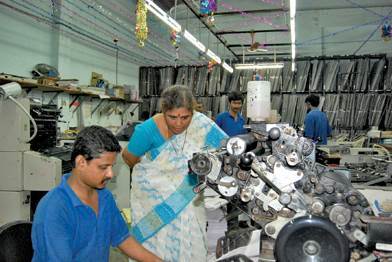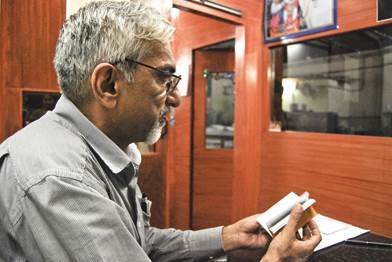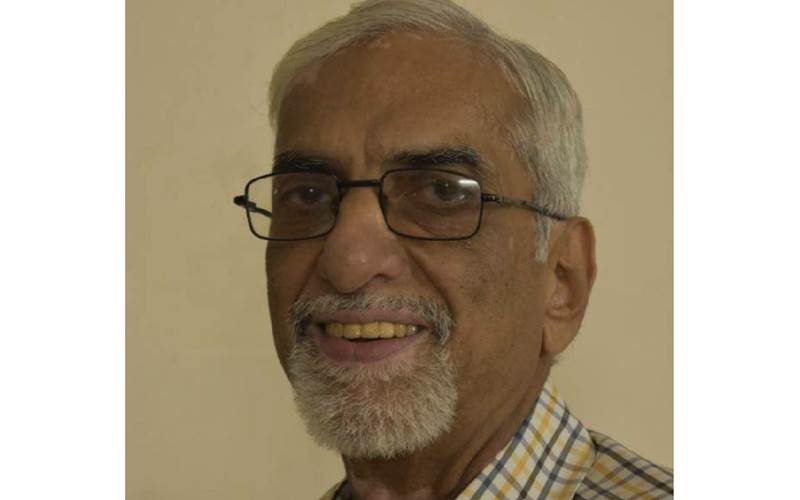Jatin Vasandani RIP
Reprographic was established in 1983 with an electronic typewriter, a cut-and-paste table, one manual photocopying machine to make a foil master, and a Swift 150 offset press, at a tiny location in Secunderabad. What many people in the print industry don't know is, it continued to operate from Secunderabad and gradually, it created a pro-women environment. “Over 40% of our 50+ employees are women," said Jatin Vasandani, who passed away on 19 January.
21 Jan 2022 | By Ramu Ramanathan
Like many others, Faheem Agboatwala was shocked when he heard the news about Jatin Vasandani's death on 19 January. The director of Hi-Tech Printing Services and past president of BMPA, said, “Print technocrat Jatin P Vasandani or just JP was known for his infectious smile." Agboatwala added, “JP was one of the most enthusiastic supporters of BMPA's Print Summit at the NCPA and STB. He always wanted to learn and share. Amongst his many friends, I will miss him and his lively attitude.”
Hyderabad-based JP was an IIT-K (1974 batch) and IIM-Kolkata (1979 batch) alumnus. His first job was as a graduate engineer trainee in L&T in the Instruments Division (Group Three). Thanks to one outspoken comment, he was assigned an MBA's job as executive assistant to the group's general manager.
After three years at L&T, JP joined IIM Calcutta. He said, “In retrospect, I am happy that I did not make it to IIM in Ahmedabad. Once again, it was thanks to being 20 minutes late for the CAT (Common Admission Test)."
Due to IIM-C's leftist orientations, he did a full semester course and understood in 1977 what Shashi Tharoor's recent book The Inglorious Empire: What the British Did to India now discusses after 41 years. JP was one of the five candidates who boasted of a Marxist Economics credit.
In 1979, JP gave up three very unusual, interesting job offers in Goa, Bombay and Calcutta to work for a 400-employee group of three SSIs. He said, “This is because I assumed that I had to handle the litigation that started on the day after I landed at home for a holiday. There was a court attachment on my mother's flat that she acquired after great ordeals."
After being at the brunt of “some random nonsense from the boss for two-and-a-half years", JP quit to become "a reluctant entrepreneur", because he couldn't get a job in the twin-cities of Hyderabad and Secunderabad. From 1982, he explored many types of businesses.
JP and Reprographics
Finally in 1984, JP set up a printing business, Reprographics, “to prove that one could make money on an India-made small offset machine."
He said, “I had run through my PF savings in a few months. Now with money borrowed at 2.5% per month, in a few months, I had over ten employees and a monthly salary bill of Rs 25,000, with a total capital employed of only about Rs 100,000." And so it was. Reprographics printed India's first weekly newsletter on shares, the Hifco Investment Advice for three years, before the big players in Mumbai entered the field.

JP said, “The simplest way to print an artwork created by DTP was by small offset. So, in 1987, Zeta Marketing (JP's company) took off, selling in the first year, one third of the total production of Swift small offset machines in Andhra Pradesh. The all-India market took a couple of years to develop. By the mid-1990s, we had an installed base of over 700 machines in AP and Tamil Nadu. This became a sunset business in the late 1990s with the GoI opening up the import of second-hand machines.
That is when the printing business gained momentum. Before Lehman Brothers happened, Reprographics was printing during peak season, “two million pages of course material per day for a coaching institute — 99% of the business coming from one customer."
JP: the print innovator
When PrintWeek visited Reprographics, one saw a culture of print quality. JP deployed the best ink though there were — and are — many cheap inks available in the market. He used good quality blankets" Also, the firm started a concept of control sheets where apart from the print run quantity, the margins for each job were specified. Changing the blankets as and when required; servicing the machines to maintain the quality. From day one, this system has been followed. In addition, the staff had regular breaks, regular supply of tea and snacks plus rights for the employees and staff.
I remember it was one of the most neat-and-clean factory shops in the city of Hyderabad. In those days, it housed 10 Swift mini-offset plus three Orient web offset presses (two with a 578-mm cut-off and one with a 508-mm cut-off size). All this was managed by Shobha Subramaniam, who headed the unit.
Subramaniam is not part of a traditional owner-family. And so, even though women have made great strides in the print world in the last decade, women from all income classes are still too often discouraged by family members from having careers that infringe too much on family life.
Shobha Subramaniam had shared with PrintWeek during an interview that “after a series of jobs which included executing the project of installing and commissioning air cooling plants to movie theatres," how she met JP Vasandani, the proprietor of Reprographic in 1985.
She recalled: “The interview with JP was interesting. JP asked me to proofread a document that he was proofreading. He told me that it would take five minutes to finish the proofreading." Subramaniam spotted one mistake in the word ‘continuous’ and as JP says, “She ‘continues’ to work with Reprographic."
Subramaniam stepped into the press. Interestingly enough, a few years later, JP gave her total responsibility following a labour issue. She recalled those “tough days" in the early nineties, “I took the decisions. Sometimes they were not the right decisions. But I had JP’s backing. He guided the team, always."

A visit to Chatta Bazar with JP
That was the time I visited Hyderabad's Chatta Bazar along with JP. There were only three litho units. This was a far cry from the 50 functional presses a short time ago. Mohammed Abdul Qhadeer, the fourth generation at Daira Electric Press, told us (during a cumbersome job change) that, “ever since the new-age offset print firms were established in Lakdi Ka Pool, we proved to be ineffective."
JP went out of his way and we traced Syed Abdul Karim. It was one of my most memorable interviews for PrintWeek. The 87-year-old epitomised Chatta Bazaar. His long-term memory was razor sharp. He recalled the pre-partition days, when he was “young and full of idealism”. He printed a newspaper, Mirzani. The newspaper was printed with Kanpuri inks on a double demi litho press. All in all, 7,000 copies in English and an equal number in Urdu were printed. It shut down and re-located to Pakistan in 1947. Syed Abdul Karim stayed in India. “I was not worried. India had imaandaar leaders like Nehru and Gandhi.” Post partition, Karim saab worked as a production in-charge at Milap, again, a bi-lingual newspaper. Besides which he serviced and procured machines from Mumbai and Gondiya (in West Maharashtra); and printed three-colour beedi label jobs.
I took away vital lessons from that meeting with Syed Abdul Karim. So did JP. He felt “the print business was fragile".
That was the time, JP invested in Helios and created a software support team with “only one major customer to support". Whenever we met, he used to talk about “WebShare UB2 being a rugged German software product that has to the best of my knowledge, no bugs." Once done, we moved on to discuss the books and cinema, plus hunt for a good wada pav on the streets of Lower Parel.
Other than Helios, JP explored many ventures. But diversification failed. JP said, “I got carried away with my variable data printing venture, borrowing money, again at 18 to 20% per annum, hoping it would take off in the ‘next few months'. The substantive debts have been cleared. The printing business is stagnating, but still makes money to build a retirement corpus."
Rest in peace JP Garu. You shall be missed.
In Memoriam: JP Vasandani
I had the privilege of working with JP Vasandani for 27 years (1985-2012). The trust JP reposed in me during my tenure was phenomenal; he always gave me a free hand in the running of Reprographic and Printing Services. He was always there to guide me as a good mentor.
Women’s empowerment was important to him, and to foster it he gave his women employees every opportunity to learn and excel in every sector of work in the press. His encouragement and on-the-spot interventions - for example, he got a separate room for infant care - enabled women to grow in the printing sector without personal worries, and I am a living proof of that.
His nature was innately generous and he helped a large number of people grow and prosper. Today, as I look back I see his zesty laugh, and the larger-than-life space he occupied wherever he went. He will always be remembered!
Rest in peace, JP.
Shobha Subramaniam












 See All
See All